- Home
- Julie Smith
Jazz Funeral (Skip Langdon #3) (Skip Langdon Mystery) (The Skip Langdon Series) Page 5
Jazz Funeral (Skip Langdon #3) (Skip Langdon Mystery) (The Skip Langdon Series) Read online
Page 5
She wanted a shower, she wanted to wash this thing off her, but she couldn’t go home. She was absolutely, utterly, completely, devastatingly alone in the world. That much she knew. Unless … could she call Madeleine Richard? No way! She almost laughed at the absurdity of it. Richard was always saying how she was Melody’s friend, she was her advocate, but who paid Richard? Melody’s mom. She was bought. And she was an adult. No way was Melody trusting any adult. Not after what had happened. She was alone. Completely alone. Absolutely alone. She hadn’t known it was possible to feel so alone.
There wasn’t even a kid she could trust. Well, maybe Joel. Yes! Maybe Joel. But she couldn’t just turn up at his house. And she certainly couldn’t go to Flip’s. And she’d run away from Blair’s. That left exactly nobody.
She walked down streets she didn’t think her parents would think to go, but she knew she had to get out of sight pretty soon. They’d come looking. She had to decide what to do. She had a few bucks in her jeans pocket, enough to take a bus, but—where to? And then when she got there, what was she going to do for money?
As she walked, as her tears dried and her head cleared, she became aware of a curious, liberated optimism, almost a high. The down side was she’d lost everything and everybody in one tragic ten-minute interval. But there was an up side. If she could pull it off. She was beginning to see the rosy edges of it, to hear one of her favorite songs in a way she never had before. It was “Me and Bobby McGee,” a song she’d heard a thousand times, sung a thousand times, cried over. The line that was getting to her was, “Freedom’s just another word for nothing left to lose,” a sentiment that always before had seemed unbearably sad. But reverse it and what did you have? “Nothing left to lose is just another word for freedom.”
Freedom!
That was something you didn’t get when you were sixteen. What you did get was school at eight A.M., and your mom telling you what to do, and no car because your dad said you were too young, and no career, no real career yet because your dad said you were too young, and curfews because your dad thought you were a baby and just generally that sort of thing—prison, more or less, because you were too young.
The only way to get around it was to run away, and Melody had never thought of that before. Why should she? Okay, so her mom and dad weren’t perfect, but she had had Ham and Ti-Belle. And Flip, and her friends, and most of all, her music.
Which was the key. The rest of it was gone, but what really counted anyway? The music. It was her life. It was what she loved most and what she wanted to spend her life doing, and she could go so much faster, she knew it… it was the only thing she could depend on. It was what was going to get her out of this hole.
If she were on her own, she could sing—did she dare say it?—professionally. She could bypass high school and college and sororities and other people’s weddings and her own first divorce and all that crap.
She could be a professional singer tonight!
Ti-Belle had done it. She could do exactly what Ti-Belle had done—get on a bus for the French Quarter and join a street band.
The great Ti-Belle Thiebaud had actually done that. Caught the bus in New Iberia or St. Martinville, somewhere like that, and roared right on down to the Quarter.
Yes, but Ti-Belle has a great voice.
Well, hell, I do too.
I think.
But I don’t know. I’ve never had a chance to try it out. All I’ve ever done is sung at parties for Country Day kids.
I can do it! I know I can do it!
The debate raged within her even as she sat quietly on the bus, but it didn’t matter. Maybe she couldn’t do it, but she sure as hell was going to try.
She’d finally gotten the idea of following the railroad tracks to Schwegmann’s, knowing she wasn’t about to see any of her friends’ moms there. Mothers of Country Day kids didn’t shop at Schwegmann’s. Melody laughed, knowing she was through with that crap forever. She was an artist now, above the petty concerns of the petite bourgeoisie.
Once at Schwegmann’s, all she had to do was wait at the bus stop on Airline Highway, and zap!, she was on her way to la boheme.
Gradually, the memory of what had just happened began to recede in her consciousness. Thoughts of the past gave way to thoughts of the future. True, self-doubt intruded, but it drifted in and out. A horrible thing had just happened. And yet, she thought, I’m okay. I think I’m okay.
Daydreaming, looking out the window, seeing nothing but her own internal movie, she was actually happy. She saw herself singing on a street corner in the Quarter, tourists surrounding her, throwing money in an open guitar case, murmuring to each other, “She’s good,” as if it were the last thing they expected. “She sounds like Janis Joplin.” “She’s fabulous. What do you think she’s doing here?”
And their friends would say, “She’s a runaway, probably. Poor thing, they probably beat her at home.”
Or she’d fool them; they’d never think she was underage. Some of them would be from large recording companies and one or two would give her their cards and ask her to lunch and buy her champagne (not realizing she was only sixteen). They’d say they’d recognized her talent and give her advice on what to do—help her make a demo tape, that sort of thing—she wasn’t sure exactly what was entailed—and then they’d fly her out to California and sign her up.
And next year she’d sing at JazzFest. Or maybe the year after—not next year, she might be recognized. She saw herself on the stage—a big stage, not one of the little ones for local groups—and this time she was also surrounded by admirers, but hundreds, thousands of them, and they wouldn’t be expressing surprise that she was good—they’d know her by her albums. And when she came out, she’d sing her favorite song, Janis’s song, “Get It While You Can.” That’s the way she’d warm them up, it would be her trademark, because it was what she lived by. You had to get what you wanted, what you could get, you couldn’t go waiting around, because you might not be here tomorrow.
Melody believed that. The song was about love, but she thought it a metaphor for life. It didn’t seem sad or tragic to her that she would die young, she just knew she would. Well, she didn’t really know it, she just thought it was possible; very likely, actually. She couldn’t say why. It just seemed that way. Janis had died young, and her life had been wonderful. She had escaped her provincial Texas roots and people had loved her, had stood and cheered for her; Janis had achieved love on a national scale. And she had done everything there was to do before she was twenty-seven. She had defied convention and gone her own way, and been her own woman. The fact that she died young seemed romantic, almost poetic.
I know! I’ll write a song about it.
She couldn’t believe she hadn’t thought of that before. What a wonderful homage, what a perfect … but wait. She saw why it hadn’t occurred to her. Because she hadn’t been ready. And now she was. If ever she was going to be, she was now, when she saw how fragile life was, how you could lose everything—including, maybe, your mind—in about thirty seconds.
Ham had turned her on to Janis Joplin. I lost him and he gave me Janis. She marveled at the tragedy, the fearful symmetry of it. The minute Melody heard those throaty, hoarse, all-body tones coming up from the bottom of Janis’s toes, full-out, full-tilt boogie, which was the way she always sang, (“CCrrrryy, baaaaaaaaby!” or “Ttttrrrrryyyyyyyyyyy just a little bit harder!”) she had thought, I didn’t know a white woman could do that. She knew Etta and Irma, Bessie Smith, Billie Holiday, all the great blues singers—Ham had given her a terrific music education—but she’d simply had no idea a white woman could produce a sound like that. Ti-Belle sang great, sure—Melody’d love to be as good as Ti-Belle—but the fullness of Janis, the total involvement, the feeling there—that was something else again. She felt almost reverent about it.
Okay. She would write the song, and then next year, after “Get It While You Can,” she’d sing it. It would be a beautiful tribute, and she owed it to Janis,
who inspired her personally as well as artistically.
Melody got a comfortable, warm feeling, thinking about it, about all the good things to come. It was like being in a cocoon, or sitting dry in front of a fire on a rainy day. She came out, she saw the crowd, and through the magic of her inner television, she saw herself onstage, belting her heart out. Joel was there—she had another identity now, but she could trust Joel and she’d take him with her, straight to the top. He was the only one from her past life she could trust, but at least there was one. He was lead guitar. She had a huge band behind her. Huge. All black. And she was black too. Somehow in the fantasy, she’d turned black.
I wish, she thought. Don’t I wish.
She tried to readjust the daydream, see herself in a more realistic way, but she couldn’t. She didn’t know what the new Melody would look like, the Melody who wasn’t a girl, wasn’t a wannabe, but the one who’d metamorphosed—who was an artist and a woman, respected as such by the world. Not her family (her late family, she meant), not the kids at Country Day, but the whole world! She had that potential now, to be that person.
But she had no cultural context for it. Her dad was a businessman, her mom—what?
Somebody who gets her nails done.
Neither had graduated from college, but that wasn’t the point. The point was, they didn’t take her seriously. They didn’t know what she was, didn’t understand her. She hadn’t been named Melody because they hoped she’d have musical talent, but because her mom had thought it was cute. Ham had been the one who introduced her to music. If it hadn’t been for Ham, she’d probably be on drugs. Because music was her escape. Her escape and her inspiration. A place she could go to get away, to be somebody else, not to have to live where she lived, with those odd people she was related to. She didn’t understand them. Why would you spend your life selling sandwiches? Melody could see it if you really needed to, but her dad loved it. What kind of person would make that his whole life, ignore his family, ignore the daughter he had late in life, who should have been the apple of his eye? Actually, he said she was, but he never paid attention to her except to forbid something. That was the way she’d describe her father: forbidding.
Her mother was worse. She didn’t care about anything except her damned appearance. Melody was never going to wear makeup, never going to color her hair, certainly never going to have manicured nails. You couldn’t even play the piano with nails like that.
Why couldn’t she have been born a Boucree, like Joel? It wasn’t so impossible; New Orleans was full of families like the Boucrees—the Nevilles, the Marsalises, the Batistes, the Thomases, the Lasties, the Jordans—families where music was life. It was the family business and you went into it. They taught you to play the minute you were old enough to hold a drumstick, and you were performing at JazzFest by the time you were seven. It had happened to Joel. She’d watched him play last year with the Boucrees and had nearly jumped up and down, shouting that she knew him, and not only that, she played in a band with him. That she, Melody Brocato, was that close to greatness. Of course, the Boucrees were black and so were all the others. Why couldn’t she have been black? Been born into one of those big, warm, loving families where your mom cooked up great pots of red beans and rice while she sang a version of “Amazing Grace” that had passersby stopped dead in their tracks on the sidewalk—on the banquette, Joel would say.
Now she saw herself as a little girl. The singer-to-be was gone, but she was still black. She was sitting around the dining room table with her three brothers and two sisters and her mom and dad and her two uncles and they were eating greens and chicken and black-eyed peas, all laughing, teasing each other, but gently, with deep affection. It was all good-humored, sweet-tempered, no mean jokes, no nasty stuff like white people got into. Melody was about five. She had light skin and medium-curly hair that hung in ringlets, one especially, that hung down over her right eye. She had a winning smile and people were always patting her, saying how cute she was, not correcting her every two seconds and finding fault. It was so vivid she could almost smell those peas. It felt so good to be loved like that. Her life would have been so damned easy if it had happened to her. Why did white people have to be so fucked up?
She got off the bus angry, stomped for half a block or so till she came back to the present. But finally it occurred to her that here she was—free at last! She should be celebrating.
Oh, sure. Celebrating. No friends and no family and I’m supposed to celebrate.
It went back and forth like that. Just when she’d be feeling good, she’d remember, and then she’d have to get herself back up again. Okay, that was just how it was going to be. She wasn’t going to think about it. She was going to pretend it never happened, those people never existed. She was someone else now, a street musician soon-to-be-a-star. All she had to do was get herself a gig.
She wandered on down toward Jackson Square, and right in front of the cathedral were two guys and a woman, maybe in their twenties, maybe a little bit younger, playing some not bad to pretty decent music. She listened for a while. They knew a lot of local stuff, some Cajun kinds of things, some country—Melody knew almost everything they did, and thought they were pretty good, but from the looks of things, this was no way to make a fortune. They weren’t really drawing a crowd. On the other hand, a singer could make all the difference. Her palms began to sweat as she tried to get up the nerve to do something. She wasn’t sure what. So she just kept watching.
The guitar player was cute, and looked young. Maybe not much older than she was. He wore torn jeans and a black T-shirt, and he was blond. Flip, her ex-boyfriend whom she never wanted to see again, was dark. And of course Joel… but she couldn’t get Joel. He was two years older and thought she was a baby, treated her like a little sister. Besides, they had a professional relationship. Or so he said whenever she kidded around, sort of flirting but not really because she didn’t dare. She couldn’t see why you couldn’t be in love with somebody you worked with, but Joel was the boss. He was a pro, so she had to listen. Or anyway, it used to be that way. Today was a whole new ball game. From now on she could make up her own rules.
The guitar player had good shoulders, slender build, and a cute butt. His skin was tan, not peaches and cream, but it was as clear and delicate as a girl’s. If he shaved more than once a week, she’d be surprised. And something else she liked a lot. He had beautiful hands. Long fingers, very clean. Nice square-cut nails. She watched his hands as he fingered the guitar, and found herself wanting to touch them, wanting them to touch her. She watched so intently it was almost like falling into a trance. It felt as if there was nothing else in the world but herself and those fingers, so why shouldn’t she simply go get them? The need to do it was almost overpowering. Dr. Richard talked sometimes about impulse control—her mom and dad both had poor impulse control, and so, sometimes, did Melody. If she managed not to embarrass herself by grabbing this strange boy on a street corner, that would be a step in the right direction. She knew this thing that was happening to her, she’d felt it before—she just didn’t know how to handle it. She knew perfectly well it was caused by the runaway truck called hormones, but that didn’t make it any easier. Or any less delicious.
It occurred to her suddenly that she could do it with this boy. This strange boy with the perfect skin, the pretty planes in his face—if he wasn’t involved with the female bass player, she could do it with him. She felt her face go hot. Her palms started sweating again.
I could do it tonight.
Tonight! This afternoon, half an hour ago, there had been nothing, and now there was this. The only reason she’d never done it with Flip was fear. She’d hardly ever let him touch her below the waist because it got her too hot. If they did that too much, she’d do it, she knew she would, and then someone would find out and her father would kill her. She might get pregnant, that was always a possibility, but it wasn’t as bad as her father’s wrath. Actually, she didn’t know if he’d kill her. But he�
�d yell, and she couldn’t stand the yelling.
God, what a baby! I don’t believe what I’ve done. I’ve sacrificed my womanhood because I’m afraid of my daddy yelling.
She hadn’t put it to herself quite that way before. She was ripe, she was ready, she felt as sexual as anybody else, she was pretty damn sure of that, and yet she was a virgin. All because she was intimidated by a geriatric parent. It shamed her to think of it.
Tonight could be the night. It would be a rite of passage. She’d become a woman in more ways than one.
The band stopped playing. What were they doing? Gathering up their money, it looked like. Going.
Suddenly, reality intruded in a big way. Now was the time to talk to them, before they got away. But what was the use? They were going to hate her. He was, especially. What had she been thinking of? Did she imagine she could get anybody she wanted, any strange boy on the street? Was she crazy—what on earth would he want with her? She was just a kid with a biggish nose and fuzzy-looking hair. Anyway, he was probably involved with the bass player, the redhead.
Okay, she had to do it. Had to or go home, and she had no home. She spoke to the woman because she felt shy and it was easier that way. “I really liked your music.”
The woman had on a white tank top that made her look washed-out. Her hair was a peachy color, like Sissy Spacek’s, and she wore no makeup. She looked friendly, though, and she had a nice smile. “Thanks.”
“Are you leaving?”
The drummer, who was overweight and whom she’d hardly noticed, gave her a look that made her cringe. He’d noticed her. He had little pig eyes that looked hostile. “We think we’ve got enough to go eat. What’s it look like, Chris?”
The blond had been counting the money. He said, “Eight bucks, give or take.”

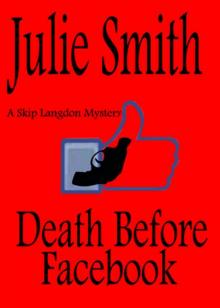 Death Before Facebook (Skip Langdon #4) (Skip Langdon Mystery) (The Skip Langdon Series)
Death Before Facebook (Skip Langdon #4) (Skip Langdon Mystery) (The Skip Langdon Series) P.I. On A Hot Tin Roof
P.I. On A Hot Tin Roof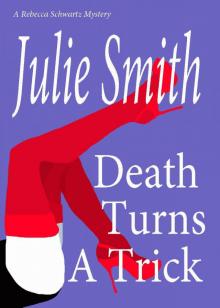 Death Turns A Trick (Rebecca Schwartz #1) (A Rebecca Schwartz Mystery) (The Rebecca Schwartz Series)
Death Turns A Trick (Rebecca Schwartz #1) (A Rebecca Schwartz Mystery) (The Rebecca Schwartz Series)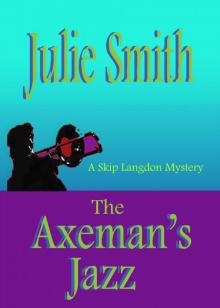 The Axeman's Jazz (Skip Langdon Mystery Series #2) (The Skip Langdon Series)
The Axeman's Jazz (Skip Langdon Mystery Series #2) (The Skip Langdon Series)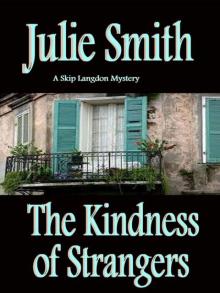 The Kindness of Strangers (Skip Langdon Mystery #6) (The Skip Langdon Series)
The Kindness of Strangers (Skip Langdon Mystery #6) (The Skip Langdon Series) Louisiana Hotshot
Louisiana Hotshot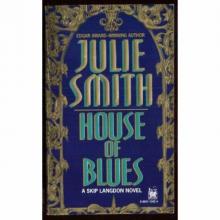 House of Blues
House of Blues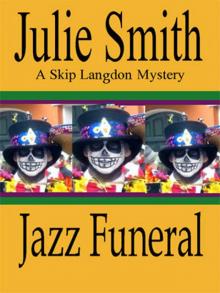 Jazz Funeral (Skip Langdon #3) (Skip Langdon Mystery) (The Skip Langdon Series)
Jazz Funeral (Skip Langdon #3) (Skip Langdon Mystery) (The Skip Langdon Series) Tourist Trap (Rebecca Schwartz #3) (A Rebecca Schwartz Mystery) (The Rebecca Schwartz Series)
Tourist Trap (Rebecca Schwartz #3) (A Rebecca Schwartz Mystery) (The Rebecca Schwartz Series) Louisiana Bigshot
Louisiana Bigshot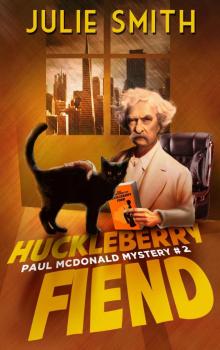 Huckleberry Fiend
Huckleberry Fiend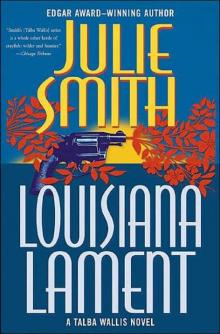 Louisiana Lament
Louisiana Lament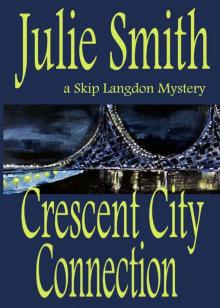 Crescent City Connection (Skip Langdon Mystery #7) (The Skip Langdon Series)
Crescent City Connection (Skip Langdon Mystery #7) (The Skip Langdon Series)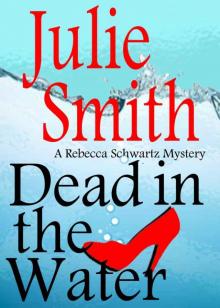 Dead In The Water (Rebecca Schwartz Mystery #4) (The Rebecca Schwartz Series)
Dead In The Water (Rebecca Schwartz Mystery #4) (The Rebecca Schwartz Series)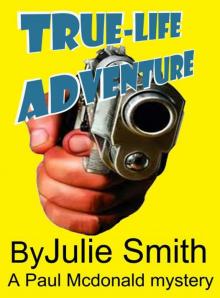 True-Life Adventure
True-Life Adventure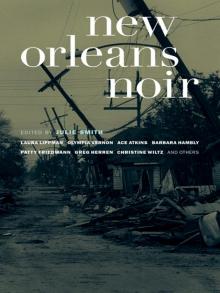 New Orleans Noir
New Orleans Noir